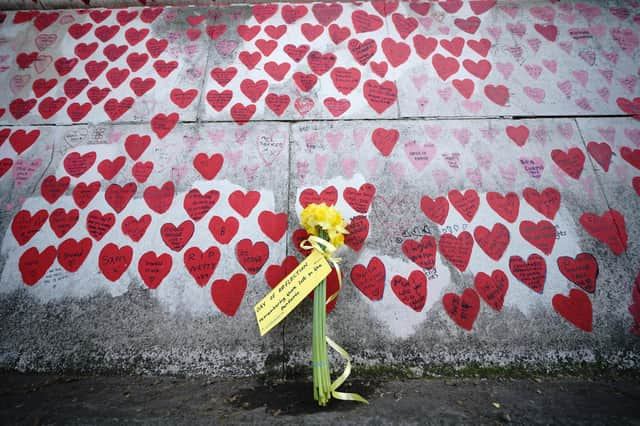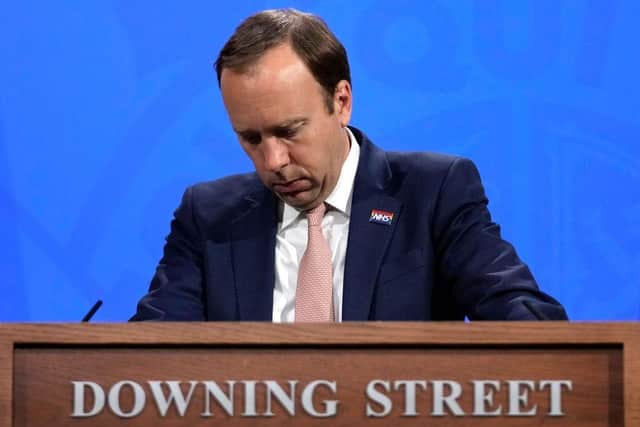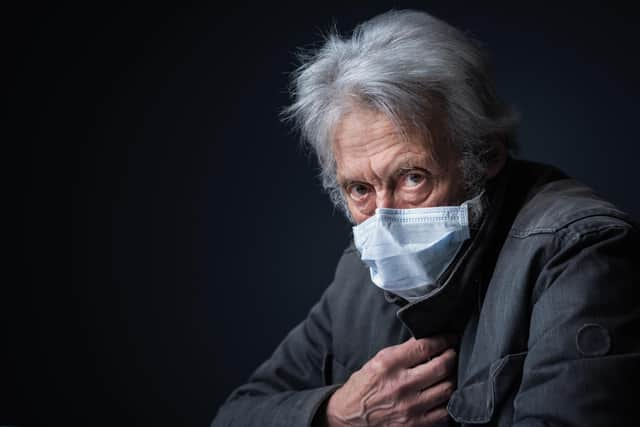Covid Inquiry: How vulnerable people became victims of 'state sanctioned murder' during Covid-19 pandemic


Admissions by Boris Johnson’s former aide Dominic Cummings laid bare the UK’s lack of planning for vulnerable people during the Covid pandemic, leaving interest groups to condemn the government’s “state sanctioned murder” – but what lessons have been learned since then?
The former Prime Minister’s aide Dominic Cummings appeared before the UK Covid Inquiry on Tuesday, where he said a “dysfunctional system” during a “meltdown of the British state” failed to deal with the crisis, while Johnson allegedly downplayed the pandemic.
Advertisement
Hide AdAdvertisement
Hide AdMr Cummings said vulnerable groups such as ethnic minorities and domestic abuse victims were “entirely appallingly neglected” during lockdown considerations.


He said “one of the most appalling things” was the lack of a shielding plan in March 2020 “and the Cabinet Office was trying to block us creating a shielding plan”.
The inquiry also received diary entries from former chief scientist Sir Patrick Vallance, which said Mr Johnson was “obsessed with older people accepting their fate and letting the young get on with life” and getting the economy running.
Another note from Sir Patrick in December 2020 suggested the then prime minister agreed with Tory MPs that Covid was "nature's way of dealing with old people".
The comments have sparked anger among groups representing vulnerable people and those that lost their lives during the pandemic.


Aamer Anwar, the human rights lawyer representing Scottish Covid Bereaved, said the attitudes of the UK Government during the pandemic were “psychotic”.
“We already knew there was a culture of impunity and incompetence at the heart of number 10, but what has been exposed through the whatsapps is a psychotic mindset that treated the elderly, the disabled and vulnerable as expendable,” said Mr Anwar.
“The horrific attitudes can be described as nothing other than state sanctioned murder.
Advertisement
Hide AdAdvertisement
Hide Ad“We now see why some have been so vociferous in their criticism of the UK Inquiry, it’s because this inquiry has stripped away the true nature of a government who believed the vulnerable were no better than toxic waste.


“It was deeply traumatising for many to hear the claims that those guarding the nation’s health, including the Prime Minister and many within his party argue ‘Covid was nature’s way of dealing with old people’.”
Adam Strachura, head of policy and communications at Age Scotland, said older people were already more vulnerable due to austerity, as “good things in our communities had already been felled by the sword”.
“What we saw at the beginning of the pandemic, for a long period of that first period, was things that didn't exist that could really have helped people,” said Mr Strachura.
“Support had to be set up from nothing, whether it was food support, or health support issues, or a whole range of things which were best sort of created and delivered in communities.
“One of the things we've seen for years and years of cuts and financial reprioritisation is that the good things in our communities have already been felled by the sword – and then during the pandemic had to be created from nowhere.”
“People get incredibly lonely at all ages, but especially older people and especially during a pandemic,” added Mr Strachura.
“When services are moved online, there are still hundreds of thousands of older people who don't use the internet, and some of the older people who do aren’t that proficient.
Advertisement
Hide AdAdvertisement
Hide Ad“Older people had a very difficult time. They were asked to shield, without anything en masse to support them.
“Those same people who might not be online, might not be able to register for food delivery services, to access their banking, to do simple things.
“There is an increasing number of single pensioner households in Scotland. That loneliness, the impact on their mental health, the care they get on a daily basis was removed.
Messages shown to the UK Covid Inquiry showed that in October 2020, Mr Johnson stressed the need to “recalibrate” away from a nationwide lockdown because it was mainly elderly people dying.
After looking at data on age and fatalities, Mr Johnson suggested “get Covid and live longer”.
“Social care packages were turned off overnight,” said Mr Strachura, “older people were made more vulnerable.
“I remember people calling the national helpline and telling us they hadn’t eaten in a few days. The food packages took time to be implemented.”
A recent survey by Age Scotland, of 4,167 older people living across Scotland’s 21 local authorities, found that Covid-19 continues to have an impact on older people.
Advertisement
Hide AdAdvertisement
Hide AdWhilst the largest cohort of respondents (41 per cent) were going out as much as they had prior to the pandemic, 15 per cent were going out less because they were concerned about their health - with 23 per cent of respondents aged 85-89 were going out less because they were concerned about their health in comparison with 10 per cent of respondents aged 55-59.
Just 40 per cent of respondents said that they never felt lonely whilst 49 per cent sometimes felt lonely.
Respondents aged 50-54 were more likely than respondents in other age ranges to say they felt lonely most of the time.
“There’s still a gap in services,” added Strachura.
“Older people are still going a week at a time without talking to another person – 100,000 people are lonely regularly.
“We’ve lost the fabric of our society, particularly community groups.
It’s harder than ever before to access social care. The staff are burned out, there’s problems with recruitment. These challenges were amplified by the pandemic – it wasn’t going swimmingly beforehand, but it made everything much worse.
“Older people are missing out on their entitlements and what they need to live well. I’m not sure there’s enough focus on fixing that. Is there the political impetus to reform it and fix the systems? I’m not sure.”
The Scottish Covid Inquiry, which will be investigating the decisions of the Scottish Government during the pandemic, has been hampered by the revelation that many of the Whatsapp messages between ministers during the pandemic have been deleted.
Advertisement
Hide AdAdvertisement
Hide AdReports suggest figures including Nicola Sturgeon and the Scottish Government’s national clinical director, Jason Leitch, may have deleted correspondence.
The Scottish Government’s policy on informal messaging, such as through WhatsApp, suggests “business conversations” conducted on the platform should be deleted “at least monthly”.
Ms Sturgeon told journalists on Tuesday that she has “nothing to hide” and she is expected to give evidence to the inquiry again in the new year.
During First Minister’s Questions on Thursday, Humza Yousaf defended his predecessor after Scottish Conservative leader Douglas Ross accused the Scottish Government of having a “secretive approach” to the issue.
Mr Yousaf said Ms Sturgeon had ensured “full accountability, full transparency” during the pandemic.
Deputy first minister Shona Robison has confirmed that at least 14,000 WhatsApp messages will be handed over to the UK Covid Inquiry.
Around 70 witnesses, potentially including First Minister Humza Yousaf, former Scottish Cabinet Secretary for Health and Social Care Jeane Freeman, Cabinet Secretary for Covid Recovery John Swinney and key backroom officials, were involved in around 137 WhatsApp or other instant messaging groups during the Covid-19 pandemic.
Ms Robison told MSPs that policies had been followed at all time and published documents from November 2021, after the commitment to hold an inquiry was made, that encourages those within government to delete “business conversations” within a month, once they have been recorded officially.
Advertisement
Hide AdAdvertisement
Hide AdMr Ross said Ms Sturgeon and others would have broken the law if they destroyed messages relevant to the Scottish and UK inquiries.
Mr Anwar, responding to the revelations, said the families he represents just “want the lies to be exposed”.
“There should be no hiding place for those – whether in Scotland, England, Wales or Northern Ireland – who failed to follow the science,” said Mr Anwar.
“Pathetic, deeply flawed leaders catastrophically failed at the very moment that the most vulnerable in our nation needed them.
“There is a widely held view that our leaders throughout the UK were arrogant because they never thought they would be held to account.
“They callously disregarded the cries of the vulnerable and their families, and that applies to both Scotland as well as England.
“Our clients will not accept any more excuses or attempts to disrupt the work of the Covid inquiries, anyone who tries must face the full weight of the law and if that means imprisonment then so be it.
“Many families still suffer today, the vulnerable continue to be denied a voice, there must be changes in the law to give a voice to the voiceless that is the very least that the bereaved deserve.”
Comments
Want to join the conversation? Please or to comment on this article.